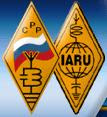The 21st Russian Radiosport Team Championship
The Russian Radiosport Team Championship (RRTC) is an annual head to head “Field Day” style competition which is organized by the Russian Amateur Radio Union (Soyuz Radiolyubitelei Rossii – SRR), originating in the USSR in 1980. In 2012, twenty five teams will be invited, which represent the many different regions of the Russian Federation.
The distance between team positions is roughly 0.5 kilometer, so the antennas of the nearest two or three teams will be visible from each operating position. Organizers will supply teams with identical tents, tables, chairs, 220 V gas generator and gasoline, output power indicator, 10m-high steel sectioned tower and a triband antenna. Teams are required to bring their own 100 W (limited) transceivers, computers and peripherals, 40m-band InvV dipole, antenna switching devices, filters etc. Participants of Russian Radiosport Team Championship are also responsible for base camp set-up, as well as all antenna assembly & tower assembly/raising.
Participants can make QSOs among themselves and the rest of the world, so everybody is invited to the party. Usually the basic activity on the bands is generated by Russian radio amateurs; to raise QSO rates, the teams use new callsigns and exchanges every two hours. On average, 1300 QSOs by the top teams are not uncommon during the eight-hour contest. There is no limitation on band or mode changes, although only one signal can be transmitted at one time.
Every team will be accompanied by an official contest referee, who will monitor all actions, power output & the audio signals. Each referee will be assigned to teams from a pool of qualified referees provided by teams. The rules for the teams are complete in detail, any deviation from the published rules is strictly prohibited. During the contest period, an audio recording will be made for each team. Online scores will be made available via the internet. After the competition ends, email logs will accepted from around the world during a four hour period immediately following the end of the contest. After that, computer checking of the logs will commence, and the final results will be ready the following morning.
Rules for outside participants
- Date and contest period: The Saturday of the third full weekend of July (July 21st, 2012) beginning 07:00 and ending 14:59 UTC. Both Single and Multi operator stations may operate the entire 8-hour period.
- Everybody can work everybody.
- Modes: CW and SSB.
- Bands: 7, 14, 21 and 28 MHz.
- Band and mode can be changed at any time. Only one signal is allowed at a time.
- Exchange: Outside participants sends RS (RST) and ITU zone number.
Russian Radiosport Team Championship competitors sends RS (RST) and three character combination, e.g. 599 XYZ. - Station with the same call-sign may be worked on different bands.
- Scoring Point System:
QSO with RRTC station (sends three character combination in exchange) – one point.
QSO with outside participant from the same ITU zone – one point.
QSO with outside participant from different ITU zone on the same continent – three points.
QSO with outside participant from different ITU zone on different continent – five points. - Multipliers: ITU zone and new three-character combination received from an RRTC team – one point for the multiplier on each band (regardless of mode).
RRTC station gives no ITU zone multiplier. - The score is the product of total points and total multipliers.
- Entry categories:
A – Single operator, CW, high power.
B – Single operator, CW, low power (100 W and less).
C – Single operator, SSB, high power.
D – Single operator, SSB, low power (100 W and less).
E – Single operator, mixed (CW and SSB), high power
F – Single operator, mixed (CW and SSB), low power (100 W and less).
G – Multi operator team (2 or 3 operators), mixed (CW and SSB). - Awards and Logs:
Certificates will be awarded to the world’s top three scoring stations in every category.
Achievement commemorative souvenirs will be awarded to those participants making at least 250 confirmed QSOs, including 25 QSOs with RRTC competitors, and submitting email logs to ochr@srr.ru. Logs must be submitted no later than 19:00 UTC, July 21st, 2012.
Any contest logging software can be used which supports IARU HF World Championship. Only email logs are accepted, Cabrillo log format shall be used according to IARU HF Championship requirements. File name should be “mycall.cbr” or “mycall.log” where “mycall” is your callsign. Please send the file as an attachment to ochr@srr.ru or, what is more preferably, use electronic submission of logs at http://upload.srr.ru/.
 YB Land DX Club DX-ing Is Our Life
YB Land DX Club DX-ing Is Our Life



